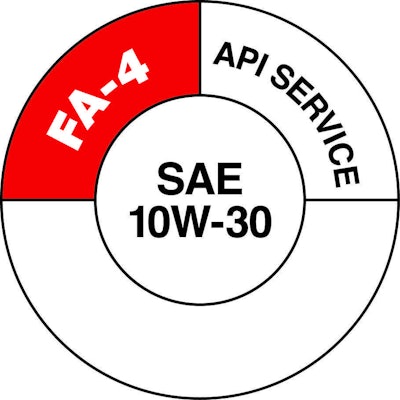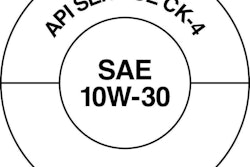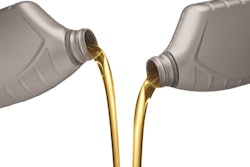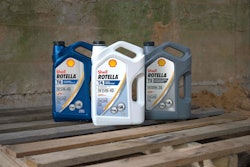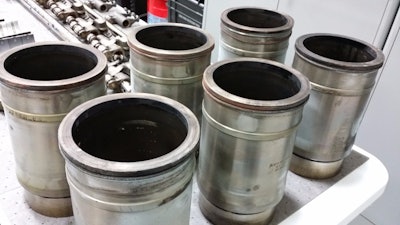 Shell Rotella showed off the durability of ‘thinner’ oil in this engine teardown demonstration last year.
Shell Rotella showed off the durability of ‘thinner’ oil in this engine teardown demonstration last year.When licensing and distribution begin for the two new heavy-duty diesel engine oils in December, it’s paramount for fleets and owner-operators to be aware of the new categories and ensure they’re using the proper engine oil in their equipment, says a representative from the American Petroleum Institute.
“New oils are coming. They’re coming very soon, and you need to make sure you know which one you’re supposed to use,” said Kevin Ferrick, manager of API’s global industry services certification programs. “Oils are different enough and unique enough today that you need to be sure you’re buying the right oil.”
Ferrick spoke to CCJ editors in Tuscaloosa, Ala., on Thursday, July 28.
Licensing for the two new diesel lubricants, CK-4 and FA-4, begins Dec. 1, 2016, which is the first day oil marketers like Shell Rotella, Chevron Delo and Mobil Delvac can sell lubricants officially stamped as CK-4- and FA-4-certified by API.
CK-4 oils will essentially replace the current CJ-4 oil spec on the market today and will be backwards compatible with diesel engines currently using CJ-4.
FA-4 will be much more limited in its use. It will be recommended almost exclusively for 2017 year-model engines and newer, and it will only be recommended for long-haul applications.
Ferrick strongly advises fleets and owner-operators to check with their engine’s manufacturer to ensure they’re using the oil recommended for their engine when the new products come to market.
Ferrick says CK-4 oils improve upon CJ-4 oils by better protecting against engine oxidation, oil shearing, oil aeration and degradation of the oil due to soot. CK-4 is also expected to improve fuel economy and generally work more efficiently with modern engines.
Ferrick says consumers using older engines could see engine life benefits from using CK-4 instead of CJ-4, which will still be available following the licensing of CK-4 and FA-4 products.
FA-4 oils offer the aforementioned benefits of CK-4 oils, but they’re designed to increase fuel economy in new engines. FA-4 oils are deemed low-viscosity oils, as they’re “thinner” (less viscous) than CK-4 oils and therefore allow engine parts to operate more efficiently. FA-4 oils have been proven to protect engines as well as CK-4 and CJ-4 oils, despite their thinner design. The API certification procedure is designed to ensure FA-4 oils protection engines just as well as their higher viscosity counterparts, Ferrick says.
The development of the new lubricants was spurred by modern engine design and federal regulations requiring reduced greenhouse gas emissions. Today’s engines run hotter, are more powerful and more efficient than engines of yesteryear, and engine manufacturers requested new lubricants to fit their new needs.
New emission regulations taking effect next year call for a reduction in greenhouse gas emissions, primarily emissions of carbon dioxide. To achieve those emissions reductions, fuel economy needs to be boosted, Ferrick says. FA-4 oils were designed to help engine makers reach those fuel economy goals.
Ferrick’s key message to fleets and owner-operators regarding proper oil use is simple: Check with your engine manufacturer. “It’s not something you get cute about,” he said. “You need to be sure you’re using exactly what’s recommended. It’s that precise now. Not all oils are the same. You could end up with lower performance if you get the wrong oil.”
For fleets that buy in bulk, Ferrick warned against mixing CK-4 and CJ-4 oils. Fleets need to empty their CJ-4 tanks before filling them with CK-4. “You don’t need to clean it or flush it,” he says. “But you don’t want to mix them. Fleets need to draw their tanks down before adding CK-4 or FA-4 oils.”
To prepare for the launch of the new products, Ferrick says API is trying to get the word out to fleets, owner-operators and technicians across all outlets.
API has a site dedicated to helping users choose the right oil — dieseloilmatters.com — along with a marketing and advertising campaign built around the same message: Diesel oil matters.
Oil containers like drums and off-the-shelf bottles will also feature the new API donut for CK-4 and FA-4 oils. The CK-4 donut will look just like existing donuts — a plain white circle that designates them as CK-4. The donut for FA-4 lubes, however, will be slightly different. The top half of the donut will be split into two quadrants, and the FA-4 designation will be in reverse type or will feature a splash of color, like the donut below.
